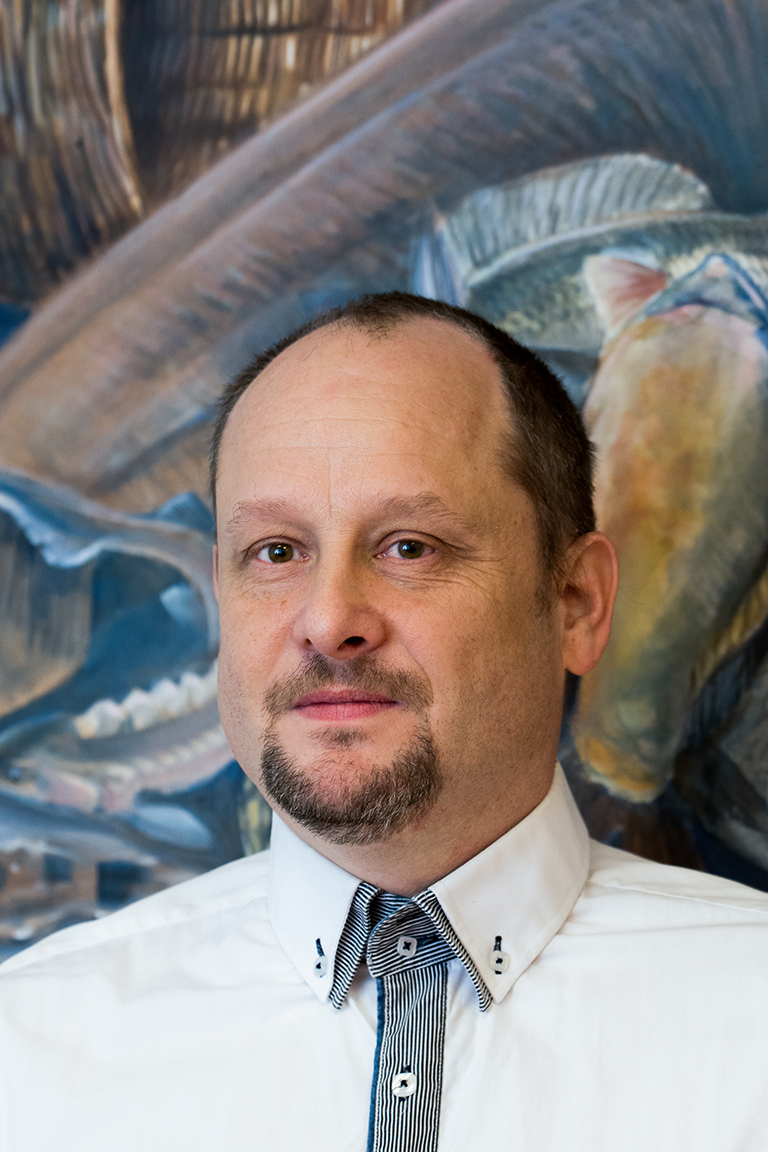Prof. Dr. Tamás Müller - MATE Research
Overview
Tamás Müller is a professor at the Department of Freshwater Fish Ecology of the Institute of Aquaculture and Environmental Safety.
His research focuses on technology development of induced fish reproduction, larvae and juvenile rearing under controlled condition. His expertise lies in the artificial induction of sexual maturation and propagation of fish. In addition, his work concentrated on the ex-situ conservation biology of threatened and endangered fish species.
Prof. Tamás Müller’s work contributes to questions of understanding how it is possible for spermatozoa to maintain their fertility for a long time in the ovaries of externally fertilized female fish, and how this property can be used to improve fish propagation.
His theoretical work examines how internal fertilization or internal gametic association and ‘placenta formation’ in fish could have developed in terms of evolutionary biology. His empirical work has assessed these theories in settings ranging from literature data synthesis to own experimental results in externally fertilized fish.
Across his research, he uses an own developed new fish propagation method.
His results play a significant role in the development of practical fish breeding technology, as well as in ex situ and field in situ conservation works. During his research work conducted in a team, 7 intellectual products were created.
He made significant contributions in the fields of fish propagation technology and endangered/ threatened fish conservation.
He has authored and co-authored 90 research articles in high-impact scientific journals.
Prof. Müller has collaborated with several research groups across Europe and worldwide, and he has successfully applied for 10 research grants nationally and internationally.
He is a member of the editorial board of the journals Aquaculture Studies as well as the Pisces Hungarici.
Research keywords:
Publications
Kucska, B., Quyen, N.N., Havasi, M., Staszny, Á., Ivánovics, B., Vranovics, K., Griffits, J.D., Urbányi, B., Müller, T. (2024). Asellus aquaticus removal of unfertilized fish eggs and possible use in aquaculture as a biological control organism. Scientific Reports 14, 7295. https://doi.org/10.1038/s41598-024-57903-4
Müller, T., Ferincz, Á., Weiperth, A., Ivánovics, B., Tóth, B., Bógó, B., Horváth, J., Urbányi, B., Specziár, A. (2024). Uncommon life history and winter spawning of common carp (Cyprinus carpio) in a natural thermal spring, under temperate climate. Journal of Fish Physiology and Biochemistry https://doi.org/10.1007/s10695-024-01305-w
Müller, T., Horváth, L., Szabó, T., Ittzés, I., Bognár, A., Faidt, P., Ittzés, Á., Urbányi, B., Kucska, B. (2018). Novel method for induced propagation of fish: sperm injection in oviducts and ovary / ovarian lavage with sperm. Aquaculture 482, 124-129.
https://doi.org/10.1016/j.aquaculture.2017.09.025
Müller, T., Kucska, B., Horváth, L., Ittzés, Á., Urbányi, B., Blake, C., Guti, Cs., Csorbai, B., Kovács, B., Szabó, T. (2018). Successful, induced propagation of African catfish (Clarias gariepinus) by ovarian lavage with sperm and hormone mixture. Aquaculture 485, 197-200.
https://doi.org/10.1016/j.aquaculture.2017.11.051
Müller, T., Matsubara, H., Kubara, Y., Horváth, Á., Kolics, B., Taller, J., Stéger, V., Kovács, B., Horváth, L., Asturiano, J.F., Peñaranda, D.S., Urbányi, B. (2018). Testing cryopreserved European eel sperm for hybridization (A. japonica × A. anguilla). Theriogenology 113, 153-8.
https://doi.org/10.1016/j.theriogenology.2018.02.021
Projects
NKFI Alap (NKFI_K_ 135824): Fish propagation by using sperm insemination into ovarian lobes (2020-2024)
There are difficulties to propagate several economically important or endangered fish species by using tradional method (based on gamete collection). In that case induced spawning/tank spawning, pen spawning the only way to reproduce them. Our newly developed method, which based on sperm insemination into ovarian by using catheter, allows targeted breeding work, which has so far been limited to induced spawning method. As a result, genetic diversity can be increased - in case of spawning fish, targeted crossings can be performed, insemination can be carried out with qualified or manipulated semen. A further result of the work is that we better understand the physiological features of the infertilized fish and the process of fertilization of the fish (possibly including the initial or complete process of embryogenesis), which provides answer for important evolutionary development. https://akvakultura.uni-mate.hu/en/projektek
NKFI (2020-1.2.4-TÉT-IPARI-2021-00011): Optimization and practical applications of new fish propagation methods for future of fish culture (2020-2024)
The new propagation methods developed by MATE researchers enable large-scale classical fish propagation procedures (e.g., controlled spawning, manipulated sperm) that were previously difficult or infeasible in induced spawning. The project partners guarantee the success of applying this new propagation method to economically important freshwater fish (pikeperch, African catfish) and marine fish (sea bass). This effort is supported by leading agricultural-focused universities (MATE and Akdeniz University), the research institute (MFRPTI), one of the most important fish processing and production companies in Hungary (V95 Ltd.), and the most significant aquaculture company in the Mediterranean (Kilic Holding). https://palyazatok.uni-mate.hu/web/mate-p%C3%A1ly%C3%A1zatok/2020-1.2.4-t%C3%A9t-ipari-2021-00011
MBZ Species Conservation Fund (No: 242533675). Captive breeding using new tools and methods as demonstrated by the Rakovitza rudd(2024-2025)
The main objectives of the project are the captive breeding of the critically endangered fish species and the maintaining of a population reserve in captivity, available for reintroduction in case of ecological restoration of their natural habitat.





